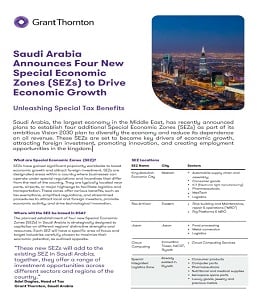-
Supply Chain and Operation Services
An optimised and resilient supply chain is essential for success in an ever-evolving business landscape
-
Business risk services
The relationship between a company and its auditor has changed. Organisations must understand and manage risk and seek an appropriate balance between risk and opportunities.
-
Marketing and Client Service
We offer strategy, client service, digital and insight solutions to businesses that are shaping the future across the Middle East.
-
Forensic services
At Grant Thornton, we have a wealth of knowledge in forensic services and can support you with issues such as dispute resolution, fraud and insurance claims.
-
Transaction Advisory
Globalisation and company growth ambitions are driving an increase in transactions activity worldwide. We work with entrepreneurial businesses in the mid-market to help them assess the true commercial potential of their planned acquisition and understand how the purchase might serve their longer-term strategic goals.
-
Growth services
We have designed and developed growth services to support your business at each phase of its growth. So whether you are an SME that has just set up or a large business wishing to expand, at Grant Thornton we will help you unlock your potential for growth.

-
IFRS
At Grant Thornton, our IFRS advisers can help you navigate the complexity of financial reporting.
-
Audit quality monitoring
Having a robust process of quality control is one of the most effective ways to guarantee we deliver high-quality services to our clients.
-
Global audit technology
We apply our global audit methodology through an integrated set of software tools known as the Voyager suite.

What are Special Economic Zones (SEZ)?
SEZs have gained significant popularity worldwide to boost economic growth and attract foreign investment. SEZs are designated areas within a country where businesses can operate under special regulations and incentives that differ from the rest of the country. They are typically located near ports, airports, or major highways to facilitate logistics and transportation. These zones offer various benefits, such as tax exemptions, simplified regulations, and streamlined procedures to attract local and foreign investors, promote economic activity, and drive technological innovation.
Where will the SEZ be based?
The planned establishment of four new Special Economic Zones (SEZs) in Saudi Arabia is strategically designed to capitalize on different regions' distinctive strengths and resources. Each SEZ will have a specific area of focus and target industries carefully chosen to maximize their economic potential, as outlined opposite.
- King Abdullah Economic City in Makkah will focus on Automobile supply chain and assembly, Consumer goods, ICT (Electronic light manufacturing), Pharmaceuticals, MedTech, and Logistics.
- Ras Al-Khair in the Eastern Province will focus on: Shipbuilding and Maintenance, repair & operations (‘MRO’), and Rig Platforms & MRO.
- Jazan, where the focus will be on Food processing, Metal conversion, and Logistics.
- Cloud Computing Services at the Innovation Tower, KACST, in Riyadh.
- Special Integrated Logistics Zone, which exists in Riyadh, focuses on Consumer products, Computer parts, pharmaceuticals, nutritional and medical supplies, Aerospace spare parts and Luxury goods, jewellery, and precious metals.
Vision 2030 Strategy
The Saudi Arabian government has been actively promoting SEZ development as part of its Vision 2030 strategy to reduce its dependence on oil revenues and diversify its economy. The strategy aims to attract $1.3 trillion in foreign investment over the next decade and create millions of new jobs for Saudi nationals.
Supporting SEZs Development
In addition to the tax incentives and regulatory frameworks, the government has also launched several initiatives to support SEZ development, such as the Public Investment Fund (PIF), which has committed billions of dollars to infrastructure projects in the zones. The government has also established the Saudi Authority for Industrial Cities and Technology Zones (MODON) to oversee SEZ development and management.
However, the success of the SEZs will depend on several factors, such as the ease of doing business, the availability of skilled labour, and the region's political stability.
SEZs Regulations
The newly established Special Economic Zones (SEZs) in Saudi Arabia will be regulated by the Economic Cities and Special Zones Authority (ECZA). To provide transparency and gather stakeholder input, ECZA has issued a brochure and draft proposed tax and customs regulations, now available on the Istitlaa portal for public consultation until May 21, 2023.
These proposed regulations outline a range of incentives designed to attract investment and promote economic activity in the SEZs. Some of the key incentives include:
5% Corporate Income Tax for up to 20 years:
Businesses operating in the SEZs will benefit from a reduced corporate income tax rate of 5% for up to 20 years, providing a significant cost advantage compared to the standard tax rate in Saudi Arabia.
0% withholding tax permanently for repatriation of profits:
Profits earned in the SEZs can be repatriated to foreign countries without any withholding tax, providing greater flexibility and ease for businesses to transfer funds internationally.
0% customs duties on capital equipment and inputs:
Businesses operating within the SEZs will be exempt from customs duties on capital equipment and inputs imported into the zones, reducing costs and facilitating the importation of necessary resources for business operations.
Flexible, supportive regulations around foreign talent during the first five years:
The SEZs will have flexible regulations to attract foreign talent, including streamlined visa processes and residency permits, making it easier for businesses to access skilled labour from around the world during the initial five years of operation.
0% VAT for intra-SEZ goods:
Goods exchanged within the SEZs and between different SEZs will be exempt from Value Added Tax (VAT), reducing the compliance burden and transaction costs for businesses operating in the
zones.
Expat levy fee exemption for employees and their families in the zone:
Employees and their families residing in the SEZs will be exempt from expat levy fees, further reducing business costs in the zones
However, it is important to note that further information and guidance from regulatory authorities, including the Zakat, Tax and Customs Authority (ZATCA), may be required on compliance and other tax-related areas. Businesses operating in the SEZs should stay updated with the latest developments to ensure compliance with applicable regulations.
In conclusion, establishing four new Special Economic Zones (SEZs) in Saudi Arabia represents a significant stride towards achieving the country's economic diversification goals. These zones present compelling investment opportunities spanning various sectors and regions, potentially generating millions of new jobs for Saudi nationals. Furthermore, as the Economic Cities and Special Zones Authority (ECZA) outlines, the proposed tax and customs incentives aim to attract foreign investment and foster economic growth in these designated areas.
These incentives, such as reduced corporate income tax rates, exemption from withholding tax, customs duty waivers, flexible regulations for foreign talent, VAT exemptions, and expat levy fee exemptions, are anticipated to make the SEZs an appealing destination for businesses seeking to expand or establish operations in Saudi Arabia. Businesses must stay updated on regulatory guidance and ensure compliance while leveraging these incentives to maximize the advantages of operating in the SEZs.


